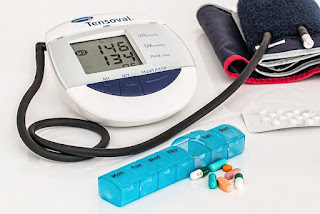If you're currently taking blood pressure medications, you may be tempted to quit the
m cold turkey. Maybe you're tired of dealing with the side effects, or you feel like you no longer need them. However, stopping blood pressure medications without consulting a doctor can be dangerous and can lead to serious health consequences.
Why is suddenly quitting Blood Pressure Medication bad?
Blood pressure medications work to lower blood pressure and reduce the risk of heart disease and stroke. Suddenly stopping these medications can cause a sudden spike in blood pressure, putting significant stress on your cardiovascular system. This can increase your risk of a heart attack or stroke, particularly if you've been taking the medication for a long time.There are several specific reasons why blood pressure may spike after stopping blood pressure medications abruptly. Blood pressure medications work to lower blood pressure by dilating blood vessels, reducing the force of blood against the vessel walls, or decreasing the volume of blood in circulation. When you stop taking these medications abruptly, the body may experience a sudden rebound effect, where the blood vessels constrict, the heart rate increases, and the blood pressure spikes.
The specific reasons blood pressure may spike after stopping blood pressure medications abruptly include:
- Increased activity of the renin-angiotensin-aldosterone system: This system regulates blood pressure by constricting blood vessels and increasing sodium and water retention. Blood pressure medications work by blocking this system, but when you stop taking the medication abruptly, the system may become overactive, leading to an increase in blood pressure.
- Increased sympathetic nervous system activity: The sympathetic nervous system is responsible for the body's "fight or flight" response, and it can increase heart rate and constrict blood vessels, leading to an increase in blood pressure. Blood pressure medications can block this activity, but when you stop taking the medication abruptly, the sympathetic nervous system may become overactive, leading to a spike in blood pressure.
- Changes in vascular compliance: Blood pressure medications can help to relax blood vessels, reducing the force of blood against the vessel walls. When you stop taking the medication abruptly, blood vessels may become stiffer, making it harder for them to dilate and resulting in a spike in blood pressure.
How To Stop Taking Blood Pressure Meds
If you want to stop taking blood pressure medications, it's crucial to talk to your doctor first. They can help you come up with a plan to gradually taper off the medication, which can help you avoid any potential complications. This may involve reducing the dose of the medication over a period of time or switching to a different medication that may be more suitable for your needs.
Tapering blood pressure medications should be done under the guidance of a healthcare provider, who can help you develop a safe and effective plan based on your individual needs and medical history. Here are some general guidelines for tapering blood pressure medications:
- Talk to your doctor: The first step in tapering blood pressure medications is to talk to your doctor. They can help you understand why you were prescribed the medication in the first place, and whether tapering is appropriate for you. They may also recommend additional tests, such as blood pressure monitoring, to help guide the tapering process.
- Start slowly: Tapering blood pressure medications should be done gradually, over a period of several weeks or even months, depending on the medication and your individual needs. Your doctor can help you determine the appropriate tapering schedule, which may involve reducing the dose of the medication gradually or switching to a different medication that may be easier to taper.
- Monitor your blood pressure: During the tapering process, it's important to monitor your blood pressure regularly. Your doctor may recommend checking your blood pressure at home and reporting any changes or concerns.
- Watch for withdrawal symptoms: As you taper your blood pressure medication, you may experience withdrawal symptoms, such as headaches, dizziness, or fatigue. If you experience any of these symptoms, talk to your doctor.
- Follow up with your doctor: Once you have successfully tapered off your medication, it's important to follow up with your doctor to monitor your blood pressure and make any necessary adjustments to your treatment plan.
Guys, blood pressure medications are typically prescribed for a good reason. If you're considering stopping them, it's essential to have a conversation with your doctor about why you want to quit and explore alternative options. Your doctor can provide you with guidance on the best course of action to take, taking into account your specific medical history, overall health, and lifestyle factors.

